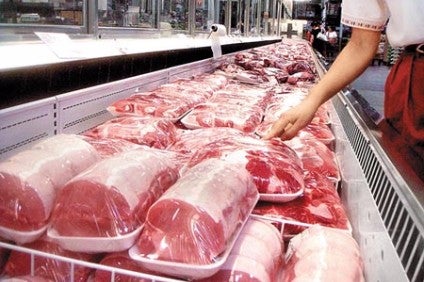
A representative association for the UK’s meat industry has approached the Government over using the services of prison inmates and ex-offenders to help address a labour shortage in the aftermath of the country’s European exit.
The Association of Independent Meat Suppliers (AIMS) said it had been informed by the Home Office the UK labour force should take priority over workers from overseas, even though “much of the food industry is facing a recruitment crisis” in the wake of Brexit, with restrictions now in place on worker movements from the EU.

Discover B2B Marketing That Performs
Combine business intelligence and editorial excellence to reach engaged professionals across 36 leading media platforms.
But despite efforts among its 250 or so members, which stretch across the industry from abattoirs to processors, butchers, wholesalers and caterers, “staffing remains a challenge”, the AIMS explained.
The organisation met today (23 August) with the UK’s Ministry of Justice to look into how its members might employ inmates and ex-offenders. The AIMS noted “one leading food manufacturer” has engaged with an unidentified prison with a view to exploring training inmates for staff positions after they are released.
Sectors throughout the food supply chain are facing difficulties in filling vacancies. Crop farmers, for example, are facing pressure in areas such as fruit and vegetable picking.
The British Poultry Council warned last week of a potential shortage of turkeys for the Christmas festive period unless the Government took action to address the widespread labour shortage and ease post-Brexit rules on the use of migrant labour.

US Tariffs are shifting - will you react or anticipate?
Don’t let policy changes catch you off guard. Stay proactive with real-time data and expert analysis.
By GlobalDataIt has asked the Government to expand its Seasonal Agricultural Workers Scheme (SAWS) – brought in to try to cope with the shortfall of EU employees following Brexit – to the meat industry as it currently only applies to the edible horticulture sector.
In the meantime, AIMS said it had approached one open prison but was told it was not allowing any more inmates out on so-called release on temporary license, or ROTL.
The meat-industry body said it has also been in touch with the Career Transition Partnership run by the Ministry of Defence, a service to assist military personnel to find employment back into civvy street. However, the numbers have so far been “low”, the AIMS said.
“A few of our members have informed us that they already have inmates on ROTL working for them and find them all to be well behaved, hard-working, and willing to learn,” the organisation said in a statement provided to Just Food. “In some cases, they wish to continue working in the food processing industry post-release.”
Referring to UK regulatory body, The Food Standards Agency, it added: “We have suggested that they look at some of the other free training available such as the FSA’s allergen training and vacuum packing training in order that offenders can leave prisons job-ready.”
A spokesperson for the Ministry of Justice said ROTL programmes had been cut during the Covid-19 pandemic but individual prisons have been reintroducing the schemes within the scope of the easing of restrictions.
“We will support all industries with skills shortages where possible and are working towards bringing levels back up towards pre-pandemic levels as restrictions allow,” the spokesperson added. “Many industries are facing skills shortages and the key priority is whether a role is appropriate for ROTL rather than which industry it lies within.”
The British Meat Processors Association representing meat companies in the UK was not in a position to comment on specific solutions regarding labour issues that might be being considered by its members on a case-by-case basis. However, a BMPA spokesperson said it was exploring “every single angle to support labour”.
The Food and Drink Federation, a UK organisation representing the country’s food and beverage manufacturers, declined to comment.
In the wider scheme of things, the British Retail Consortium and Logistics UK have called on the Government to allow temporary work visas for EU lorry drivers to alleviate a shortage impacting food supplies.
David Wells, the CEO of Logistics UK, which represents the transport sector from road to rail, sea and air, said its industry “cannot solve the problems faced by our sector on our own”.
Wells added: “As we approach the Christmas peak, during which time retailers rely on timely and plentiful deliveries, it is vital that our sector has access to the highly trained staff it needs so that we can keep delivering for the British retail sector and the UK as a whole.”



